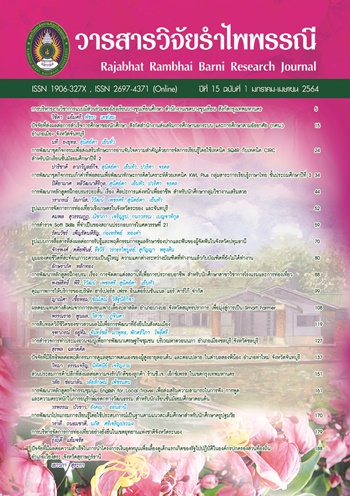มุมมองต่อชีวิตที่สะท้อนภาวะความเป็นผู้ใหญ่ ความแตกต่างระหว่างบัณฑิตที่ทำงานแล้วกับบัณฑิตที่ยังไม่ได้ทำงาน
Main Article Content
บทคัดย่อ
การเปลี่ยนผ่านของชีวิตวัยรุ่นตอนปลายเข้าสู่วัยผู้ใหญ่มีเหตุการณ์ชีวิตที่เปลี่ยนแปลงหลายอย่าง เช่น การสำเร็จการศึกษาและเข้าสู่ชีวิตการทำงาน ซึ่งเป็นก้าวสำคัญของพัฒนาการวุฒิภาวะในการเชื่อมต่อตนเองกับบริบทสังคมแวดล้อมที่กว้างขึ้น การศึกษาครั้งนี้มีวัตถุประสงค์เพื่อทดสอบความแตกต่างของมุมมองต่อชีวิตที่สะท้อนภาวะความเป็นผู้ใหญ่ เปรียบเทียบระหว่างบัณฑิตที่ได้สัมผัสกับชีวิตการทำงานแล้วกับบัณฑิตที่ยังไม่ได้ทำงานภายหลังการสำเร็จการศึกษา เก็บข้อมูลแบบสอบถามออนไลน์จากบัณฑิตมหาวิทยาลัยเทคโนโลยีพระจอมเกล้าธนบุรีที่สำเร็จการศึกษาในปีการศึกษา 2561 ผลการศึกษาพบว่า ผู้ที่ทำงานแล้วให้ความสำคัญกับการบริหารจัดการเวลา การบริหารการเงินส่วนบุคคล และการกำหนดเป้าหมายชีวิตและวางแผนไปสู่เป้าหมาย มากกว่าผู้ที่ยังไม่ได้ทำงาน สะท้อนให้เห็นภาวะความเป็นผู้ใหญ่ของกลุ่มบัณฑิตจบใหม่ที่มีประสบการณ์ทำงานแบบเต็มตัว ซึ่งจะช่วยสนับสนุนการเติบโตในชีวิตต่อไป
Article Details
เอกสารอ้างอิง
2. Ajzen, I., & Fishbein, M. (1977). Attitude-behavior relations: A theoretical analysis and review of empirical research. Psychological Bulletin. 84(5): 888-918. doi:10.1037/0033-2909.84.5.888
3. Arnett, J. J. (1997). Young People's Conceptions of the Transition to Adulthood. Youth & Society. 29(1): 3-23. doi:10.1177/0044118x97029001001
4. Arnett, J. J. (1998). Learning to stand alone: The contemporary American transition to adulthood in cultural and historical context. Human Development. 41(5-6): 295-315. doi:10.1159/000022591
5. Arnett, J. J. (2000). Emerging adulthood. A theory of development from the late teens through the twenties. Am Psychol. 55(5): 469-480.
6. Bandura, A. (1988). Self-Regulation of Motivation and Action Through Goal Systems. In Cognitive Perspectives on Emotion and Motivation. Hamilton V., Bower G. H. & Frijda N. H., Eds. Dordrecht: Springer Netherlands. pp. 37-61.
7. Crocetti, E., Tagliabue, S., Sugimura, K., Nelson, L. J., Takahashi, A., Niwa, T., . . . Jinno, M. (2015). Perceptions of Emerging Adulthood: A Study With Italian and Japanese University Students and Young Workers. Emerging Adulthood. 3(4): 229-243. doi:10.1177/2167696815569848
8. Erikson, E.H. (1959). Identity and he life cycle: selected papers. Oxford: International Universities Press.
9. Galanaki, E., & Leontopoulou, S. (2017). Criteria for the Transition to Adulthood, Developmental Features of Emerging Adulthood, and Views of the Future Among Greek Studying Youth. Europe's journal of psychology. 13(3): 417-440. doi:10.5964/ejop.v13i3.1327
10. Limanonda, B. (1995). Families in Thailand: Beliefs and Realities. Journal of Comparative Family Studies. 26(1): 67-82.
11. Nahar, Q., Xenos, P., & Abalos, J. (2013). The Changing Transitions to Adulthood across Southeast Asia: A Census Approach to Cross-National Comparisons. Annals of the American Academy of Political and Social Science. 646(March 2013): 42-68.
12. Nelson, L. J., Badger, S., & Wu, B. (2004). The influence of culture in emerging adulthood: Perspectives of Chinese college students. International Journal of Behavioral Development. 28(1): 26-36. doi:10.1080/01650250344000244
13. Nickson, D., Warhurst, C., Commander, J., Hurrell, S. A., & Cullen, A. M. (2012). Soft skills and employability: Evidence from UK retail. Economic and Industrial Democracy. 33(1): 65-84.
14. Nusrat, M., & Sultana, N. (2019). Soft skills for sustainable employment of business graduates of Bangladesh. Higher Education, Skills and Work-Based Learning. 9(3): 264-278.
15. Sergiu-Lucian, R., Roth, M., & Hărăguş, T.-P. (2014). Emerging Adulthood in Romania: Comparison between the Perceptions Twelfth Graduates and Students about Maturity. Procedia - Social and Behavioral Sciences. 149(2014): 803-807. doi:10.1016/j.sbspro.2014.08.318
16. Shukla, A., & Kumar, G. (2017). Essential Soft Skills for Employability – A Longitudinal Study. Advances in Economics and Business Management (AEBM). 4(6): 362-367.
17. Xenos, P., Achmad, S., Lin, H., Luis, P., Podhisita, C., Raymundo, C., & Thapa, S. (2006). Delayed Asian Transitions to Adulthood. Asian Population Studies. 2(2): 149-185. doi:10.1080/17441730600923117
18. Yao, C. W., & Tuliao, M. D. (2019). Soft skill development for employability: A case study of stem graduate students at a Vietnamese transnational university. Higher Education, Skills and Work-Based Learning. 9(3): 250-263.


